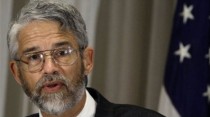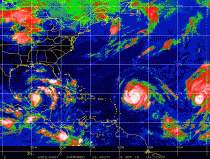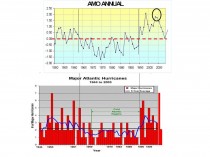
White House science adviser John Holdren speaks at the National Press Club in Washington Oct. 8, 2009. (AP Photo)
From the administration that brought you “man-caused disaster” and “overseas contingency operation,” another terminology change is in the pipeline. The White House wants the public to start using the term “global climate disruption” in place of “global warming”—fearing the latter term oversimplifies the problem and makes it sound less dangerous than it really is.
White House science adviser John Holdren urged people to start using the phrase during a speech last week in Oslo, echoing a plea he made three years earlier. Holdren said global warming is a “dangerous misnomer” for a problem far more complicated than a rise in temperature.
The call comes as Congress prepares to adjourn for the season without completing work on a stalled climate bill. The term global warming has long been criticized as inaccurate, and the new push could be an attempt to re-shape climate messaging for next year’s legislative session. “They’re trying to come up with more politically palatable ways to sell some of this stuff,” said Republican pollster Adam Geller, noting that Democrats also rolled out a new logo and now refer to the Bush tax cuts as “middle-class tax cuts.”
He said the climate change change-up likely derives from flagging public support for their bill to regulate emissions. He said the term “global warming” makes the cause easy to ridicule whenever there’s a snowstorm. “Every time we’re digging our cars out—what global warming?” he said. “(Global climate disruption is) more of a sort of generic blanket term, I guess, that can apply in all weather conditions.”
It’s unclear why Holdren prefers “global climate disruption” over “climate change,” the most commonly used alternative to “global warming.” Asked about the speech, Holdren spokesman Rick Weiss said only that the Office of Science and Technology Policy has been transparent about Holdren’s remarks. “The PowerPoint for Dr. Holdren’s Oslo presentation has been public on our website since the day after he returned,” he said. Click here to see the presentation.
In a 2007 presentation, Holdren suggested a similar phrase change—“global climatic disruption.” The explanation he gave last week was that the impact from greenhouse gas emissions covers a broad “disruption” of climate patterns ranging from precipitation to storms to hot and cold temperatures. Those changes, he said, affect the availability of water, productivity of farms, spread of disease and other factors.
He’s not the first scientist to publicly veer away from “global warming.” NASA published an analysis on its website in 2008 explaining that it avoids the term because temperature change “isn’t the most severe effect of changing climate.” “Changes to precipitation patterns and sea levels are likely to have much greater human impact than the higher temperatures alone,” the report said.
But Republicans predicted that re-branding the issue would have limited effect on the legislative effort. GOP strategist Pete Snyder said he doubts the term is going to change hearts and minds. “Are they going to change the name of weathermen to disruption analysts?” he quipped. GOP lawmakers already exploited a terminology change of their own by re-branding the “cap-and-trade” bill as “cap-and-tax.”
Holdren’s “global climate disruption” isn’t the most convoluted term to grace the climate debate, however. According to the NASA article, early studies on the impact humans had on global climate referred to the relationship as “inadvertent climate modification.” See story here.
By Nicholas Ballasy

President Barack Obama confers with his top science and technology adviser, John P. Holdren. (White House photo)
In a video interview this week, White House Office of Science and Technology Director John P. Holdren told CNSNews.com that he would use the “free market economy” to implement the “massive campaign” he advocated along with Population Bomb author Paul Ehrlich to “de-develop the United States.”
In his role as President Barack Obama’s top science and technology adviser, Holdren deals with issues ranging from global warming to health care.
“A massive campaign must be launched to restore a high-quality environment in North America and to de-develop the United States,” Holdren wrote along with Paul and Anne H. Ehrlich in the “recommendations” concluding their 1973 book Human Ecology: Problems and Solutions.
“De-development means bringing our economic system (especially patterns of consumption) into line with the realities of ecology and the global resource situation,” Holdren and the Ehrlichs wrote.
“Resources must be diverted from frivolous and wasteful uses in overdeveloped countries to filling the genuine needs of underdeveloped countries,” Holdren and his co-authors wrote. “This effort must be largely political, especially with regard to our overexploitation of world resources, but the campaign should be strongly supplemented by legal and boycott action against polluters and others whose activities damage the environment. The need for de-development presents our economists with a major challenge. They must design a stable, low-consumption economy in which there is a much more equitable distribution of wealth than in the present one. Redistribution of wealth both within and among nations is absolutely essential, if a decent life is to be provided for every human being.”
CNSNews.com asked Holdren about this passage on Tuesday after he participated in an Environmental Protection Agency forum celebrating the 40th anniversary of the Clean Air Act.
CNSNews.com asked: “You wrote ‘a massive campaign must be launched to restore a high quality environment in North America and to de-develop the United States’ in your book Human Ecology. Could you explain what you meant by de-develop the United States?”
Holdren responded: “What we meant by that was stopping the kinds of activities that are destroying the environment and replacing them with activities that would produce both prosperity and environmental quality. Thanks a lot.”
CNSNews.com then asked: “And how do you plan on implementing that?”
“Through the free market economy,” Holdren said.
CNSNews.com also asked Holdren to comment on the declaration he made in 1995 along with co-authors Paul Ehrlich and Gretchen Daily of Stanford University that mankind needed to “face up” to “a world of zero net physical growth” that would require reductions in consumption.
“We know for certain, for example, that: No form of material growth (including population growth) other than asymptotic growth is sustainable,” Holdren, Ehrlich and Daily wrote in an essay for the World Bank titled, “The Meaning of Sustainability.”
“Many of the practices inadequately supporting today’s population of 5.5 billion people are unsustainable; and [a]t the sustainability limit, there will be a tradeoff between population and energy-matter throughput per person, hence, ultimately, between economic activity per person and well-being per person,” Holdren, Ehrlich and Daily wrote. “This is enough to say quite a lot about what needs to be faced up to eventually (a world of zero net physical growth), what should be done now (change unsustainable practices, reduce excessive material consumption, slow down population growth), and what the penalty will be for postponing attention to population limitation (lower well-being per person).”
Holdren would not comment Tuesday about this statement, saying he had to get to another engagement.
------------
Obama’s Science Adviser: Don’t Call it ‘Global Warming’
By Eric Scheiner, CNS News
John Holdren, director of the White House Office of Science and Technology Policy, says that the term “global warming” is “a dangerous misnomer” that should be replaced with “global climate disruption.”
At the Environmental Protection Agency’s 40th celebration of the Clean Air Act on Tuesday, Holdren said, “I think one of the failures of the scientific community was in embracing the term ‘global warming’. Global warming is in fact a dangerous misnomer.” And in a speech last week in Norway, echoing remarks he made at a 2007 speech at Harvard University, Holdren said the term “global climate disruption” should be used instead of “global warming.”
At the 2010 Kavli Prize Science Forum in Oslo, Norway on Sept. 6, Holdren gave a presentation entitled “Climate Change Science and Policy: What Do We Know? What Should We Do?” The White House Office of Science and Technology Policy has posted a PDF-version of Holdren’s presentation of that speech on the White House Website. One panel in the presentation says: “‘Global warming’ is a (dangerous) misnomer. That term implies something...uniform across the planet, mainly about temperature, gradual, quite possibly benign. What’s actually happening is...highly nonuniform, not just about temperature, rapid compared to capacities for adjustment, harmful for most places and times. We should call it ‘global climate disruption.’”
Rudy Baum, the editor-in-chief of Chemical and Engineering News who attended the event in Oslo, and wrote in his blog about Holdren’s remarks. The blog states: “Holdren then discussed the Obama Administration’s views on climate change. ‘Global warming’ is a dangerous misnomer,” Holdren observed. “It suggests that the changes are uniform, primarily about temperature, gradual, and likely benign. None of these are true.”
“In fact, Holdren pointed out, the changes that are occurring are highly nonuniform, not only about temperature, occurring rapidly, and quite harmful to the environment. The correct term, he said, should be ‘global climate disruption.’”
On Sept. 13, 2007 during a presentation at the World Affairs Council of Northern California, Holdren said, “The widely used term of global warming is in fact a misnomer.”
“I like to use the term ‘global climatic disruption’ in preference to ‘global warming’ or even ‘global heating,’ which is maybe a little better,” Holdren said.
When addressing the issue during a Harvard symposium on Nov. 6, 2007 Holdren said, “The first message is that ‘global warming’ is a misnomer. It implies something gradual, something uniform, something quite possibly benign. And what we are experiencing is none of those. It is rapid in relation to the capacity of societies and ecosystems to respond. It is highly non-uniform and it is certainly not benign. And that’s why I prefer the term ‘global climate disruption’ to ‘global warming.’” See post here.
See post here. See much more on Climate Depot.
MIAMI (AFP) - A rare duo of powerful hurricanes roiled waters far out in the Atlantic as Tropical Storm Karl smashed into Mexico’s Yucatan Peninsula on Wednesday.
For the first time in more than a decade, two potent Atlantic storms were churning at the same time, weather forecasters said, although they posed no immediate threat to land.

See enlarged here.
“Two major hurricanes are occurring simultaneously in the Atlantic Ocean for the first time since 1999. Hurricanes Igor and Julia are both category four hurricanes,” the Weather Channel reported.
Karl made landfall about 30 miles (50 kilometers) east-northeast of Chetumal, Mexico at about 1245 GMT Wednesday, with top wind speeds of 65 miles (100 kilometers) per hour.
The 11th named storm of the season, Karl was expected to hit Mexico twice, boomeranging onto the Mexican mainland, possibly as early as Friday, after its hit on the Yucatan.
The system threatens to dump more rain on Mexico, which already is struggling with flooding in southeastern states including Veracruz and Oaxaca.
Julia surged overnight to category four strength, with top sustained winds at 135 mph (215 kph) per hour, as it moved far out in the Atlantic.
Meanwhile, Igor was a category-four hurricane, the second highest rating on the five-point Saffir-Simpson scale, the US National Hurricane Center said.
Igor whipped up dangerous swells in the Caribbean on Wednesday as it barreled west-northwest in the direction of Bermuda packing sustained winds of 145 miles (230 kilometers) per hour.
Igor is not expected to make landfall for days, but forecasters say storm swells will reach Puerto Rico and the Virgin Islands by early Wednesday and move from there to Bermuda.
Dangerous surf was also affecting the Leeward islands, and should affect some of the Bahamas Wednesday.
At 0900 GMT Wednesday, Igor’s eye was located some 570 miles (915 kilometers) east of the northern Leeward islands and it was heading west-northwestward at nine miles (15 kilometers) per hour, US experts said.
The National Hurricane Center said Karl could bring coastal flooding and up to eight inches of rain to Mexico and parts of Belize and northern Guatemala.
“A storm surge is expected to produce some coastal flooding near and to the north of where the center makes landfall,” the center said. “The surge will be accompanied by large and damaging waves.
“Karl is expected to produce total rain accumulations of three to five inches over the Yucatan peninsula, Belize and northern Guatemala, with isolated maximum amounts of eight inches,” the center added.
Almost one million people were affected by flooding this month alone, which left 25 dead. The rains, which began in July, are set to worsen as the rainy season continues to almost the end of the year.
More than one third of the Gulf coast state of Veracruz has been hit by flooding which affected some 500,000 people, according to governor Fidel Herrera.
The recent frenetic storm activity comes after prediction from forecasters that the 2010 Atlantic hurricane season would be one of the worst on record.
The National Oceanic and Atmospheric Agency (NOAA) predicted 14 to 23 named storms, including eight to 14 hurricanes, three to seven of which were likely to be “major” storms, with winds of at least 111 mph.
This is compared to an average six-month season of 11 named storms, six of which become hurricanes, two of them major.
NOAA said the period since 1995 has been one of unusually high storm activity with eight of the last 15 seasons ranking in the top ten for the most named storms. ICECAP NOTE: this relates to the AMO (Atlantic Multidecadal Oscillation) which has turned positive in 1995). The last time it was positive was an active period.

See enlarged here.


